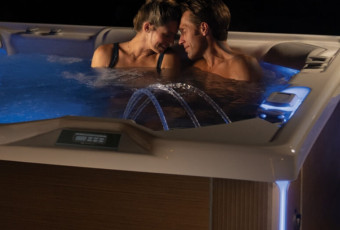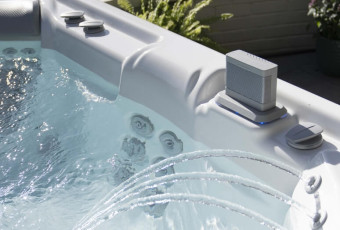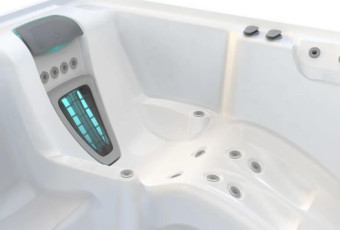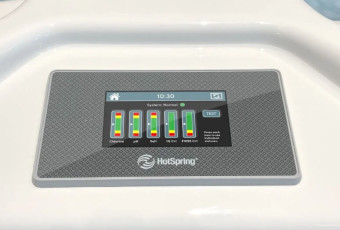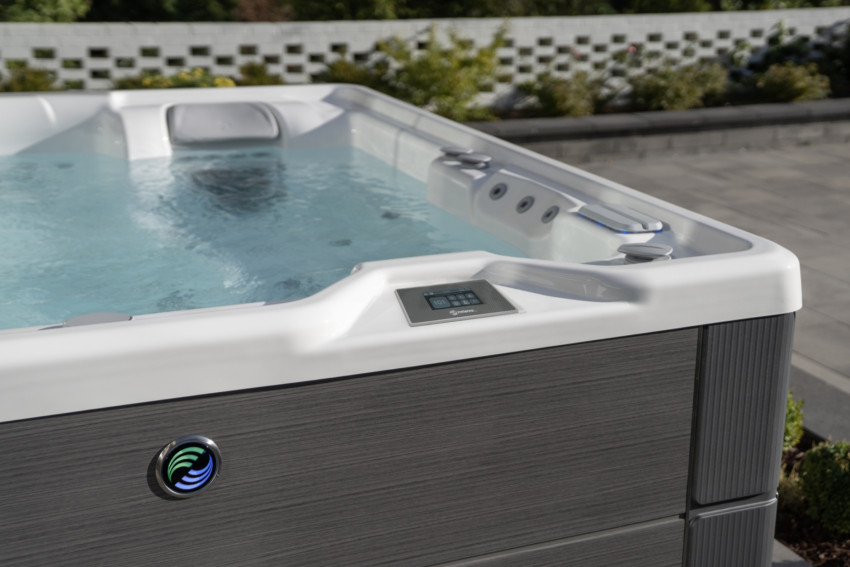If you’re the owner of a well-made, high-quality spa pool, you can expect trouble-free performance for many years—provided you conduct regular maintenance. This small investment of time will result in a significant return: the cleanest, clearest and freshest spa water, and years of extra evenings enjoying a soak.
Common maintenance includes testing and adjusting your spa water weekly, cleaning the filters monthly, and draining and refilling the water a few times a year or according to the recommendation of your water care system.
If you keep your spa pool clean and well-maintained, contaminants such as algae, mould and mildew won’t be able to develop or grow. But if you do spot visible signs of algae or mould in your water, on the body of your spa pool, or if you can smell a musty or mouldy odour while you soak, you may have an issue on your hands.
If algae, mold, or mildew are growing in your hot tub, it’s important to figure out what caused it, how to get rid of it, and how to prevent it from returning.
The leading causes of spa pool algae, mould and mildew
Algae, mould and mildew are different varieties of organic substances—algae are plants, while mould and mildew are fungi. But no matter which you find in your spa pool, all are equally unwelcome.
Algae in a spa pool can take many forms in any number of colours, including green, blue, yellow, brown, white and black. Your water could also appear cloudy, or your spa pool shell could feel slippery and slimy. Algae tends to form in a spa pool when pH levels are imbalanced or when sanitisation chemicals such as bromine or chlorine are lacking. Sunlight helps algae grow, so leaving your spa pool uncovered for extended periods can encourage it.
Mould and mildew can take the form of floating white slime in your spa water or discoloured white or black patches on your spa pool shell. Mildew is a surface fungus that can often be easily wiped away, whereas mould can be a sign of a more intensive infestation.
Mould is most likely to form in a neglected spa. It can be caused by soaps, lotions and other substances that have been transferred to the spa pool from the skin of a bather. It often establishes itself in the filters, jets or plumbing and grows from there. It’s also common for mould and mildew to first appear on a spa pool cover then spread to the water.
How to fight spa pool algae, mould and mildew
Algae, mould and mildew will not grow in a clean and properly sanitised spa tub, so if you follow proper spa maintenance procedures you should never have an issue. If you do find yourself with a minor infestation, it might be treatable simply by adjusting the pH levels to bring your spa water back to the proper balance, then shocking your tub water with sanitiser.
To ensure that the problem is eradicated for good, however, it may be necessary to drain your tub after shocking the water. After the tub is drained, clean the shell with a gentle cleanser, such as a mixture of baking soda and water or a product specifically designed for use on spa pool shells. Make sure to clean the jet nozzles and either clean or replace the filters before refilling your spa. This video demonstrates the proper method for cleaning your spa pool filters.
In cases of extreme contamination, shock the water with sanitiser once more after refilling it, then drain, clean and refill it again. This can be a time-consuming process, but it’s worth the effort to eradicate all traces of the contaminant and restore your spa water to its original, pristine condition.
If your spa pool cover is mouldy, give it a thorough clean. Remove it from your spa pool, then spray it with a mixture of dish soap and water and wipe it down. Follow up with a conditioner like Hot Spring Cover Shield™ to help keep your cover in good working condition for longer.
It’s a good idea to clean your spa pool cover on a regular basis, even if you don’t see visible signs of mildew or grime. If your cover has grown heavier over time with water saturation, it might need replacing. A waterlogged spa pool cover, in which water has permeated the vapour barrier and has soaked through to the foam core, can be a breeding ground for mould.
How to prevent spa pool algae, mould and mildew
Prevention is always better than cure. If you treat your hot tub and hot tub water well, faithfully maintaining it according to the manufacturer's instructions, you’ll never have an issue with algae, mould or mildew invading your water.
If you keep your tub covered when it’s not in use—and in the interests of energy efficiency, you certainly should—make sure your filters are cleaned and replaced according to a regular schedule, and follow all the instructions of your water care system for testing and maintenance, you are unlikely to ever experience significant problems with water contaminants.
Problems generally arise when you aren’t in control of your sanitation. If you’ve recently purchased a used spa pool, for example, it may have a pre-established mould infestation, especially if its previous owners weren’t diligent with cleaning and maintenance. For second-hand spa pool purchases it’s wise to fill it, shock the water, drain it, and clean it before refilling it, just to make sure you’re starting off with a clean and sanitary spa.
Low alkalinity levels are associated with corrosion of metal parts in the hot tub, burning eyes and dry skin and rapid pH level fluctuations.
One of the many advantages to owning your own spa is peace of mind. When you use a spa pool at a gym, hotel or even a friend’s place, you have no control over the sanitation. At home you can be certain no mould, mildew, algae or any other unwanted contaminants are lingering in the water.
As long as you take good care of your spa, you can be confident that the water will be clean and inviting every time you use it.
The Hot Spring FreshWater IQ System: less work, better water
The best way to keep your water free from mould and mildew, and more pristine than it’s ever been? The FreshWater® IQ System.
At Hot Spring we’re committed to developing innovative technologies that reduce the work and enhance the experience of hot tub ownership. Ultimately your hot tub should take care of you, not the other way around. And when you choose a hot tub fitted with FreshWater® IQ, you get exactly that – a machine that uses fewer hot tub chemicals while offering more luxurious water than anything else on the market.
FreshWater IQ is a patented, first-in-world technology that automatically tests the quality and chemical balance of your water every hour and provides clear instructions if adjustments are ever needed. It reduces hot tub water maintenance by up to 90%, and it trades manual testing for more time enjoying the finest soaking experience in the world.
It works in tandem with our FreshWater Salt System to create the world’s most advanced spa pool water care system – one that denies algae, mould and mildew the ability to gain a foothold in your spa pool, keeping your water clean, safe, soft and luxurious.
Keen to learn more about FreshWater IQ, or even feel the Hot Spring difference for yourself with a test soak? Get in touch with your local dealer today!

